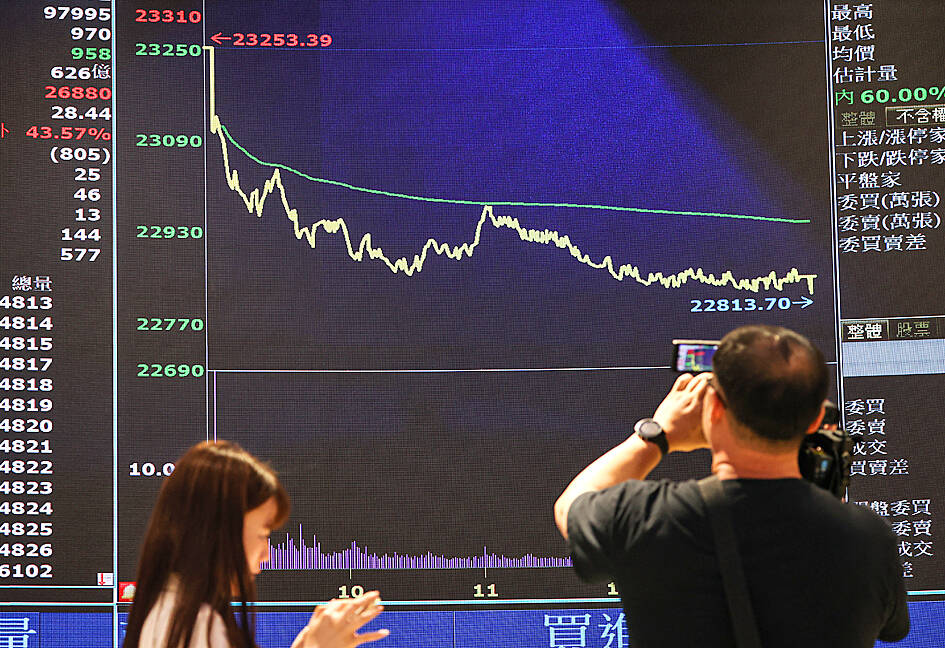Annual growth of the nation’s money supply last month picked up in the narrow M1B gauge and retreated slightly in the broad M2 gauge, as Taiwanese investors raised their holdings in local shares and foreign bonds, the central bank said yesterday.
The M1B money supply measure, which refers to cash and cash equivalents, grew 5 percent from a year earlier, compared with a 4.94 percent increase the previous month, central bank data showed.
The securities account balance last month soared by a record NT$179.9 billion (US$5.55 billion) to a fresh peak of NT$3.56 trillion, the bank said.

Photo: CNA
The advance in M1B and the securities account balance had much to do with a bullish TAIEX and the number of transactions, central bank research official Tsao Ti-jen (曹體仁) told an online news conference.
The TAIEX ended last month at a record high of 21,107 points with margin trading, a risk appetite indicator, swelling to NT$409.5 billion, the highest since June 2008, Tsao said.
The main board has benefited from capital inflows from foreign and local investors who are aiming to take advantage of the artificial intelligence boom, he said.
Meanwhile, retail Taiwanese investors displayed more interest in the local bourse than institutional players and were responsible for 56.3 percent of overall transactions, Tsao said.
A poll conducted last week by Cathay Financial Holding Co (國泰金控) found that 47.3 percent of Taiwanese are expecting the TAIEX to rise further in the coming six months and 37 percent plan to channel their cash into stock investments.
The M2 money supply measure, which encompasses time deposits, time saving deposits, foreign currency deposits, mutual funds and M1B, grew 6.04 percent year-on-year last month, slowing from an annual increase of 6.06 percent a month earlier, the central bank said.
The retreat was due to Taiwanese trimming their time deposits and increasing their positions in foreign bonds on the expectation that the US Federal Reserve would lower interest rates later this year, Tsao said.
Interest rate cuts would boost bond prices.

United Microelectronics Corp (UMC, 聯電) expects its addressable market to grow by a low single-digit percentage this year, lower than the overall foundry industry’s 15 percent expansion and the global semiconductor industry’s 10 percent growth, the contract chipmaker said yesterday after reporting the worst profit in four-and-a-half years in the fourth quarter of last year. Growth would be fueled by demand for artificial intelligence (AI) servers, a moderate recovery in consumer electronics and an increase in semiconductor content, UMC said. “UMC’s goal is to outgrow our addressable market while maintaining our structural profitability,” UMC copresident Jason Wang (王石) told an online earnings

The US Federal Reserve is expected to announce a pause in rate cuts on Wednesday, as policymakers look to continue tackling inflation under close and vocal scrutiny from US President Donald Trump. The Fed cut its key lending rate by a full percentage point in the final four months of last year and indicated it would move more cautiously going forward amid an uptick in inflation away from its long-term target of 2 percent. “I think they will do nothing, and I think they should do nothing,” Federal Reserve Bank of St Louis former president Jim Bullard said. “I think the

The TAIEX ended the Year of the Dragon yesterday up about 30 percent, led by contract chipmaker Taiwan Semiconductor Manufacturing Co (TSMC, 台積電). The benchmark index closed up 225.40 points, or 0.97 percent, at 23,525.41 on the last trading session of the Year of the Dragon before the Lunar New Year holiday ushers in the Year of the Snake. During the Year of the Dragon, the TAIEX rose 5,429.34 points, the highest ever, while the 30 percent increase in the year was the second-highest behind only a 30.84 percent gain in the Year of the Rat from Jan. 25, 2020, to Feb.

Cryptocurrencies gave a lukewarm reception to US President Donald Trump’s first policy moves on digital assets, notching small gains after he commissioned a report on regulation and a crypto reserve. Bitcoin has been broadly steady since Trump took office on Monday and was trading at about US$105,000 yesterday as some of the euphoria around a hoped-for revolution in cryptocurrency regulation ebbed. Smaller cryptocurrency ether has likewise had a fairly steady week, although was up 5 percent in the Asia day to US$3,420. Bitcoin had been one of the most spectacular “Trump trades” in financial markets, gaining 50 percent to break above US$100,000 and